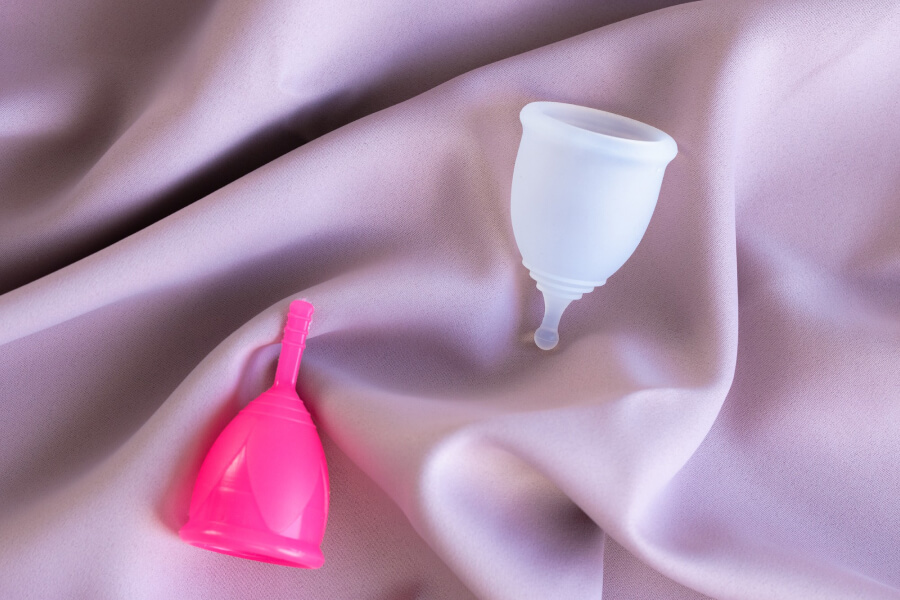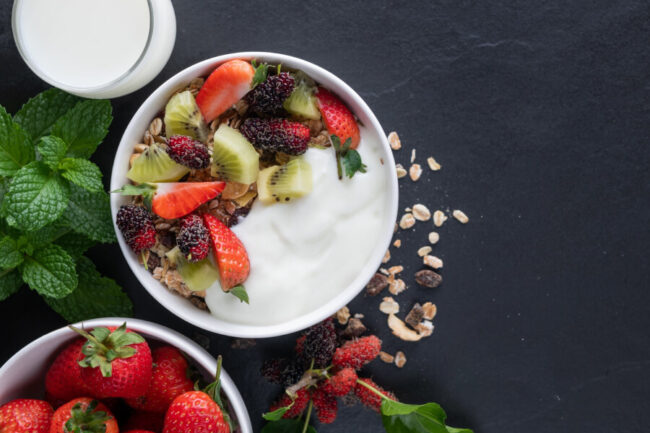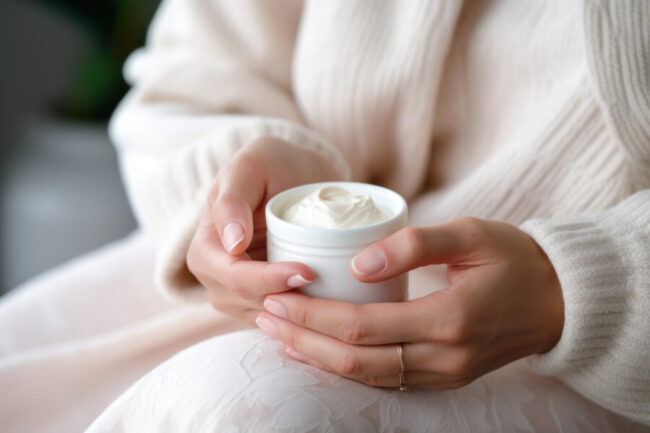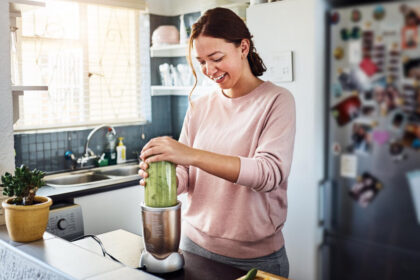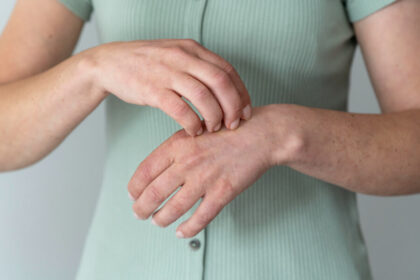The thinning, drying, and inflammation of the vaginal walls can cause discomfort, itching, and pain, making daily activities and intimate moments challenging.
Natural Treatments for Vulvar Atrophy
Exploring natural treatments for Vulvar Atrophy can be a comforting and effective way to manage vulvar atrophy. Here are some tried-and-true home natural treatments for vulvar atrophy using ingredients you likely have on hand:
Coconut Oil
Coconut oil is renowned for its moisturizing properties and can provide much-needed relief from vaginal dryness. Its anti-inflammatory and antimicrobial properties can also help prevent infections.
How to Use:
- Simply apply a small amount of organic coconut oil to the affected area.
- You can use it as a lubricant during intercourse as well.
- For best results, use it daily to maintain moisture.
Almond Oil
Almond oil is another excellent natural moisturizer. It’s rich in vitamin E and fatty acids, which nourish and protect the delicate skin of the vulva.
How to Use:
- Gently massage a few drops of almond oil into the vaginal area.
- Use it once or twice a day as needed for dryness and irritation.
Aloe Vera
Aloe vera is famous for its soothing and healing properties. It can help reduce inflammation and moisturize the skin, making it ideal natural treatments for for vulvar atrophy.
How to Use:
- Use pure aloe vera gel, either from a plant or a store-bought 100% aloe vera product.
- Apply a small amount to the affected area and leave it on.
- Repeat this 2-3 times daily.
Vitamin E Oil
Vitamin E oil can improve skin hydration and elasticity, which is beneficial for managing symptoms of vulvar atrophy.
How to Use:
- Break open a vitamin E capsule and apply the oil directly to the vulva.
- You can also mix vitamin E oil with a carrier oil like coconut or almond oil.
- Use it once a day for best results.
Yogurt
Yogurt is rich in probiotics, which can help maintain a healthy balance of bacteria in the vagina, potentially reducing symptoms of atrophy and preventing infections.
How to Use:
- Use plain, unsweetened yogurt with live cultures.
- Apply a small amount to the affected area or insert a tablespoon of yogurt into the vagina.
- Leave it for a few hours or overnight before rinsing off.
- Repeat this daily.
Apple Cider Vinegar
Apple cider vinegar can help restore the natural pH balance of the vagina and has antifungal and antibacterial properties.
How to Use:
- Mix one to two tablespoons of apple cider vinegar in a cup of warm water.
- Use this solution as a rinse for the vaginal area.
- Do this once a day.
What Causes Vulvar Atrophy?
- Menopause
- Childbirth
- Breastfeeding
- Certain medications
- Cancer treatments
Symptoms of Vulvar Atrophy
- Vaginal dryness
- Itching and irritation
- Burning sensation
- Pain during intercourse
- Urinary symptoms like urgency or recurrent urinary tract infections
- Light bleeding after intercourse
How Diet Can Help with Vulvar Atrophy
A balanced diet can play a crucial role in managing vulvar atrophy.
Foods rich in phytoestrogens, such as flaxseeds, soy products, and nuts, can help mimic the effects of estrogen in the body.
Additionally, foods high in omega-3 fatty acids like salmon, chia seeds, and walnuts can help reduce inflammation and improve overall skin health.
Exercises for Vulvar Atrophy Relief
Regular exercise can improve blood flow to the pelvic region, which may help alleviate symptoms with natural treatments for for vulvar atrophy.
Pelvic floor exercises, also known as Kegels, can strengthen the muscles around the vagina and help maintain healthy tissue.
How to Perform Kegels:
- Identify your pelvic floor muscles by stopping the flow of urine midstream.
- Once you’ve identified the muscles, contract them for five seconds, then relax for five seconds.
- Repeat this 10-15 times, three times a day.
Personal Care Products to Consider
Using gentle, fragrance-free personal care products can prevent further irritation and dryness.
Avoid douches, perfumed soaps, and bubble baths, as these can disrupt the natural balance of bacteria and pH in the vagina.
Traditional Treatments for Vulvar Atrophy that will Help You
While natural treatments for vulvar atrophy can be helpful, it’s important to be aware of traditional medical treatments for vulvar atrophy, which include:
- Topical Estrogen Creams: These can be applied directly to the vaginal area to help restore moisture and elasticity.
- Vaginal Estrogen Tablets or Rings: These provide a controlled release of estrogen to the vaginal tissues.
- Systemic Hormone Replacement Therapy (HRT): This involves taking estrogen in pill, patch, or gel form, affecting the entire body.
When to Seek Medical Help for Vulvar Atrophy?
If you’re experiencing persistent symptoms of vulvar atrophy that don’t improve with home natural treatments for Vulvar Atrophy, it’s important to seek medical advice.
Additionally, if you have severe pain, bleeding, or signs of infection, contact your healthcare provider.
How to Prevent Vaginal Atrophy?
- Stay Hydrated: Drink plenty of water to keep your body and skin hydrated.
- Maintain a Healthy Diet: Eat a balanced diet rich in phytoestrogens, omega-3 fatty acids, and vitamins.
- Regular Exercise: Stay active to improve blood flow and overall health.
- Avoid Irritants: Use gentle, fragrance-free products on your skin.
- Quit Smoking: Smoking can decrease estrogen levels and blood flow, worsening symptoms of atrophy.
Conclusion
Natural treatments for vulvar atrophy is a common but manageable condition.
By using natural treatments for Vulvar Atrophy such as coconut oil, almond oil, aloe vera, vitamin E oil, yogurt, and apple cider vinegar, you can alleviate symptoms and improve your quality of life.
Additionally, maintaining a healthy diet, exercising regularly, and using gentle personal care products can support your overall vaginal health.
However, it’s crucial to consult with a healthcare provider for proper diagnosis and treatment, especially if your symptoms persist or worsen.
FAQs
How Can Someone Treat Vaginal Dryness?
Natural treatments for Vulvar Atrophy like coconut oil, aloe vera, and vitamin E oil can provide relief from vaginal dryness. Staying hydrated and maintaining a healthy diet rich in phytoestrogens can also help.
Why Is Menopause Vaginal Dryness Uncomfortable?
During menopause, decreased estrogen levels can lead to thinning and drying of the vaginal walls, causing discomfort, itching, and pain during intercourse. This dryness can also increase the risk of infections and irritation.
How to Prevent Vaginal Atrophy?
Preventing vaginal atrophy involves maintaining a healthy lifestyle, staying hydrated with Natural Treatments for Vulvar Atrophy, eating a balanced diet, and avoiding irritants. Regular pelvic floor exercises.

